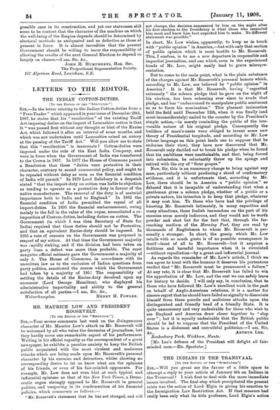MR. MAURICE LOW AND PRESIDENT ROOSEVELT.
Fro THE EDITOR OF THE "SPECTATOR."] SIR,—Your severe comments last week on the disingenuous character of Mr. Maurice Low's attack on Mr. Roosevelt will be welcomed by all who value the decencies of journalism, but they hardly cover one remarkable aspect of his performance. Writing in his official capacity as the correspondent of a great newspaper, he exhibits a peculiar anxiety to keep the British public acquainted with the most virulent and malicious attacks which are being made upon Mr. Roosevelt's personal character by his enemies and detractors, whilst showing no corresponding desire to let us know what are the opinions pf his friends, or even of his fair-minded opponents. For example, Mr. Low does not even hint at such typical and influential opinions as that of the New York Times, a Demo- cratic organ strongly opposed to Mr. Roosevelt in general politics, and unsparing in its condemnation of his financial policies, which comments as follows
Air. Roosevelt's statement that he has not changed, and will
not change, the decision announced by him on the night after his first election to the Presidency is what those who respected him most and knew him best expected him to make. No different statement was possible."
In short, Mr. Low wishes, apparently, to keep us in touch with "public opinion" in America,—but with only that section of public opinion which is most hostile to Mr. Roosevelt.
This, I confess, is to me a new departure in responsible and impartial journalism, and one which, even in the experienced hands of Mr. Low, might easily lead to grave misrepre- sentation.
But to come to the main point, what is the plain substance of the charges against Mr. Roosevelt's personal honour which, according to Mr. Low, are believed by "public opinion" in America ? It is that Mr. Roosevelt, baying "regretted extremely" the solemn pledge that he gave on the night of his election, has been scheming ever since to evade that pledge, and has "endeavoured to manipulate public sentiment so as to force his nomination." This pleasant insinuation held the field until December 11th, when it was finally (and most inconsiderately) nailed to the counter by the President's simple action,—in merely reminding the public of the irre- vocable nature of his original pledge. Consequently the builders of mare's-nests were obliged to invent some new theory of Presidential turpitude, and according to Mr. Low (whose language on this point leads one to suppose that he endorses their view), they have now discovered that Mr.
Roosevelt only decided not to break his pledge when he found that his ambitions were unattainable, and that, being forced into submission, he reluctantly threw up the sponge and retired with the cry of "Sour grapes."
Now, Sir, this is an unsavoury charge to bring against any man, particularly without producing a shred of confirmatory evidence, and it is unfortunate that, according to Mr. Low, there should be in America a "public opinion" so debased that it is incapable of understanding that when a gentleman gives a solemn pledge, whether of a public or a private nature, his intention is to keep that pledge, whatever it may cost him. To those who have had the privilege of knowing Mr. Roosevelt intimately, in many capacities and many situations, these foolish innuendoes on the part of his enemies seem merely ludicrous, and they would not be worth powder and shot but for the fact that, through the far-
reaching medium of the Morning Post, they are read by thousands of Englishmen to whom Mr. Roosevelt is per-
sonally a stranger. In short, the gossip which Mr. Low retails with so much gusto is of no possible consequence in itself—least of all to Mr. Roosevelt—but it acquires a fictitious and harmful importance when it is circulated —without repudiation—by a great and influential journal.
As regards the remainder of Mr. Low's article, I think we can agree to treat with the humour it deserves his portentous verdict that "Mr. Roosevelt must be pronounced a failure." At any rate, it is clear that Mr. Roosevelt has failed to win the approbation of Mr. Low, and the rest we can safely leave for history to decide. I will only say, in conclusion, that to those who have followed Mr. Low's excellent work in the past on behalf of Anglo-American relations, it is a matter for sincere regret that he should have failed so signally to dissociate himself from these puerile and malicious attacks upon the distinguished and friendly head of a friendly State. It is quite unnecessary and very undesirable for those who wish to see England and America draw closer together to "slop over " ; but it is equally undesirable that the British public should be led to suppose that the President of the United States is a dishonest and untruthful politician.—I am, Sir, Rookesbury Park, Wickham, Hants. ARTHUR LEE.
[Mr. Lee's defence of the President will delight all fair- minded men.—En. Spectator.]










































 Previous page
Previous page